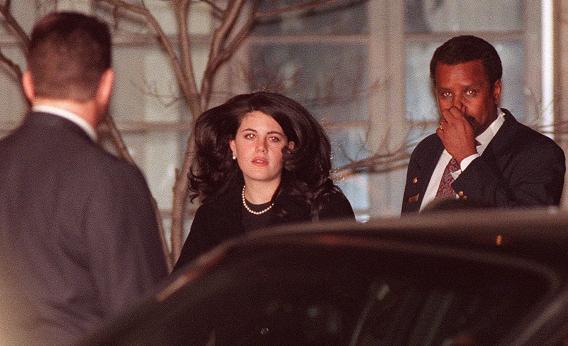The director, writer and producer of Clinton, the new documentary about Bill Clinton’s presidency airing on PBS this week, said that Monica Lewinksy was not interviewed for the show because he felt her presence would tilt the proceedings “toward sensationalism.” Even so, Lewinsky manages to be the sordid center of the four-hour program—a black hole sucking in more serious issues like the failed missile strike against Osama Bin Laden and al-Qaida. Though New York Times TV critic Alessandra Stanley argues that 11 years out of the Clinton White House, Monica is irrelevant, the still-fresh feelings various talking heads in the documentary express toward her would suggest otherwise. Lewinsky is described as hysterical and uncontrollable; at one point she’s compared to a baby who has messed its diaper.
I remember only the barest outlines of the scandal—the soiled blue dress from the Gap, Linda Tripp’s ghoulish expression, the subsequent impeachment. I wanted to hear the side of the story Lewinsky wasn’t permitted to tell in Clinton, so I went back in the televised time machine to 1999, when Monica told her story to Barbara Walters of 20/20 in what was, at the time, the most-watched single-network news program in history.
Two things stand out about Lewinsky’s appearance 13 years ago. The first is that the unfettered emotionality so lambasted by the Clinton crew reads as if it gave Lewinksy a demented but almost admirable power. When she did that interview, no one was sticking up for her, not even the feminists who should have been appalled that the married leader of the United States was futzing around with a 21-year-old intern. And yet Lewinsky stands proud, focused on her own moments of fortitude. She says that when Clinton tried to dump her, she refused to back down easily—showing up at the White House and making a fuss. “You were a real pain in the butt,” Barbara Walters tells her. She didn’t roll over for the FBI, either: In the Clinton documentary, there’s a moment when Ken Starr sends them to get Lewinsky to admit to the affair. Instead of talking, she broke down in tears instead, leaving the FBI flummoxed.
The second thing that struck me is that the Lewinsky interlude in American politics was a harbinger of the modern media cycle. The Washington Post’s Hank Steuver puts it elegantly:
“The people who feasted on Clinton scandal, Clinton dirt, Clinton pitfalls, Clinton defeats — they were miners panning for a new gold. The hyperwired frenzy we now live with is surely as much a legacy of the Clinton era as welfare reform and ‘don’t ask, don’t tell.’”
In other words, Monica was a harbinger of Client 9, “hiking the Appalachian Trail,” and national talk of open marriages. We probably would not have had the new memoir Once Upon a Secret, from another political mistress, Mimi Alford, who had an affair with JFK while she was an intern in the White House press office. The hunger for details of their tryst—Alford colored Kennedy’s hair in the Oval Office and took baths with him, replete with rubber duckies—is insatiable, as the book’s appearance atop the New York Times combined print and e-book bestseller list proves. Alford was only 19 when the affair took place. Like Lewinsky, she didn’t got to the press—her identity was revealed by the New York Daily News in 2003. As Alford describes it, going public about the affair back in the ‘60s would have only hurt her and it wouldn’t have affected the president at all.
In general this thirst for the gory details is seen as pathetic and a sign of the apocalypse, or at least the death of dignity. But in a way, Monica-gate has a potential upside, and the Alford story backs this up: It keeps powerful men from abusing their status by having affairs with barely legal underlings. After all, what president would want the world to know that he still plays with bath time toys?
